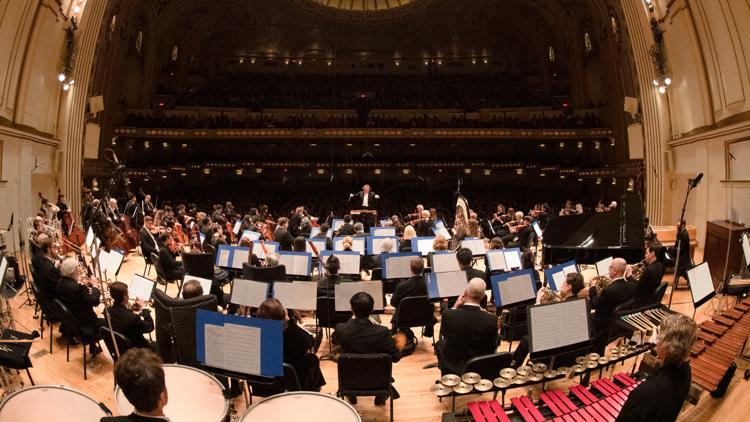The program was titled was titled after and closed with Gershwin’s An American in Paris (1928), which Slatkin conducted for the hundred-and-somethingth time. The orchestra sounded almost unbelievably warm and bright on such a cold, dark night. At intermission, Slatkin told Rod Milam of St. Louis Public Radio that he always can find something new in Gershwin's self-described "light, jolly piece," though I'm at a loss to say anything new about it other than that I smiled all the way through the performance and didn’t want the music to end.
You know Slatkin and SLSO will balance something so familiar with something unfamiliar. The first half of the program closed with an SLSO premiere of Igor Stravinsky's Ebony Concerto, which Woody Herman's band premiered at Carnegie Hall in 1946. This wonderfully strange piece of music borrows call-and-response patterns from Black folk forms (and a string quintet swapping the viola out for alto saxophone from Maceo Pinkard), but its relentless, herky-jerky repetitions reminded me in 2024 more of Philip Glass, who was a child of nine in 1946.
To appreciate how strange Ebony Concerto must have sounded at Carnegie Hall in 1946, watch Edgar G. Ulmer’s 1947 film Carnegie Hall. Though most valuable for its cameo musical performances by the likes of Jascha Heifetz, the film follows a young pianist as he defects from his classical studies to tour with a dance band not unlike what Woody Herman called his “herds.” When our hero’s doting stage mom first hears him depart from his daily diet of practicing Bach for a stride jazz workout on the piano, which now sounds perfectly at home in an adventurous piece of classical music, stage mom turns on him as if he has flourished a gun in her face.
Shout out to the kids: an ensemble of SLSO musicians may have played Stravinsky's Ebony Concerto for the first time this past weekend, but when Slatkin was music director of SLSO and very engaged with the St. Louis Symphony Youth Orchestra in 1984, Catherine Comet conducted the youth performing the concerto. It’s also enlightening (or maybe scary?) to reflect that the 1984 SLSO youth orchestra premiere of the piece was closer in time to Stravinksy’s 1946 premiere than it is to the SLSO premiere of Saturday night.
The other two selections of this second of three Gershwin concerts were closer to the edgy, disjunctive Stravinksy premiered than to the luminous, joyous and familiar Gershwin.
The concert opened with Darius Milhaud’s La Création du monde (The Creation of the World), a piece I should have known but did not. SLSO last performed it in 2017, toward the end of David Robertson’s run as music director (no more uncontrollable weeping as I type that – Stéphane Denève has won me over). The orchestra has been performing it since 1955. It premiered at the Théâtre des Champs-Élysées in 1923, the year before Gershwin’s Rhapsody in Blue, giving Milhaud bragging rights as the first composer to mash up classical music with jazz. Moreover, Milhaud collaborated on this piece with Blaise Cendrars, one of my favorite writers ever, who did his best work while living in Aix-en-Provence, where my 20-year-old daughter will be studying for the next half-year (uncontrollable weeping from prolonged separation still appropriate here).
Now, nearly 70 years after SLSO’s first performance of La Création du monde, I did not hear the African creation stories that Cendrars brought to Paris nor the Harlem jazz that Jean Cocteau hipped Milhaud to so much as I heard every classic film noir soundtrack and the derangement of cabaret music one associates with the Tom Waits of Swordfishtrombone (1983) – a record that also is closer in time to Stravinksy at Carnegie Hall than to SLSO at the Touhill (uncontrollable lapse into trance at time passing).
Speaking of deranged cabaret music, Slatkin and SLSO completed their trilogy of quirky prefaces to Gershwin with Little Threepenny Music – Suite from The Threepenny Opera (also 1923) by Kurt Weill. Slatkin introduced this suite to SLSO repertoire in 1970 during his assistant-conductor apprenticeship. That was four years after The Doors popularized Weill with their cover of “Alabama Song,” though Tom Waits had not yet been infected with crazy cabaret in New York; he was still covering Red Sovine in San Diego. In the SLSO performance at the Touhill, an ensemble of the orchestra belted out this suite of seven cabaret miniatures with abandon and glee. Not only were we treated to a rare appearance of bandoneon with the orchestra, but this also was what may have been the unprecedented second day in a row that the SLSO performed with a banjo – the banjo also appeared in Friday’s performance of Gershwin’s Porgy and Bess: A Symphonic Picture.
Slatkin greeted the audience at the Touhill on Saturday night, fresh inside the theater from the freezing air, by saying, “Look how many of you made it.” Full disclosure: I did not make it. Though I stay 1.5 miles north on Florissant Road from the Touhill, I opted to listen to the performance at home on St. Louis Public Radio as a private dinner concert for two with red wine. That itself was one of those experiences that make one reflect that St. Louis in 2024 is one of the greatest places on Earth to be alive if you love adventurous music.
Slatkin and SLSO wrap up their Gershwin festival with Rhapsody in Blue 3 p.m. Sunday, Jan. 21.


